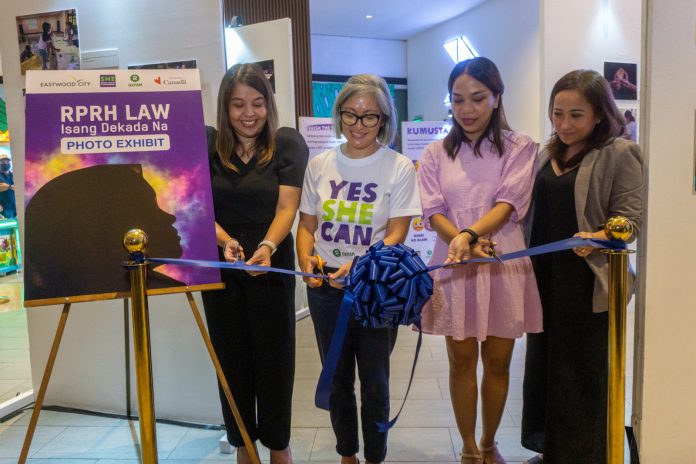International humanitarian and development organization Oxfam Pilipinas and women’s rights organizations launched a photo exhibition to mark the 10th anniversary of the passage of the Responsible Parenthood and Reproductive Health (RPRH) Law or Republic Act 10354 in Quezon City on Friday, December 9.
The photo exhibition, “RPRH Law: Isang Dekada Na,” which opened to the public from December 9 to 12 at Eastwood Mall, showcased images captured by women’s rights organizations and the media.
It depicted the journey before the passage of the law, its milestones, and the impacts of the landmark legislation on women, men, youth, people with diverse sexual orientation, gender identity, and gender expression (SOGIE), families, and communities ten years after the passage of the law.
“This event celebrates our collective efforts to pass this landmark legislation,” said Oxfam Pilipinas executive director Erika Geronimo.
“We recognize the gains, but we want to highlight that there’s more to be done to fully realize sexual and reproductive health and rights for everyone, especially those with limited access to SRHR services, commodities and information,” she said.
Geronimo said that with the photo exhibit OXFAM hopes to share the aspirations by women’s rights organizations of responding to the gaps and challenges in fully implementing the RPRH Law.
“Clearly, there is still much work to be done and many more dialogue spaces to create as we continue our commitment to promote SRHR in the Philippines,” she said.
She said among the gaps in the implementation of the law is the complete rollout of the comprehensive sexual education (CSE), the need to have more adolescent-friendly health facilities, and the provision of age and development-appropriate reproductive health education for adolescents in formal and non-formal educational settings.
The Women’s Global Network for Reproductive Rights (WGNRR) echoed these implementation gaps, which they have recently presented as the civil society organizations’ legislative agenda to lawmakers.
“Women and girls are still disproportionately affected by issues rooted in systematic problems that limit them from fully exercising their SRHR, as well as the lack of measures that will protect them from all forms of violence,” said Christelyn Sibugon, WGNRR Asia Projects coordinator.
In her message during the photo exhibit launch, Kristine Rosary Yuzon-Chavez, executive director of the Philippine Women’s Commission vowed for the formulation and adoption of new laws that promote women’s health and empowerment through the Women’s Priority Legislative Agenda.
“Ensuring women’s and girls’ reproductive health must be our utmost priority as this means improved health and well-being for our children, our families, and our communities as a whole,” Chavez said.









